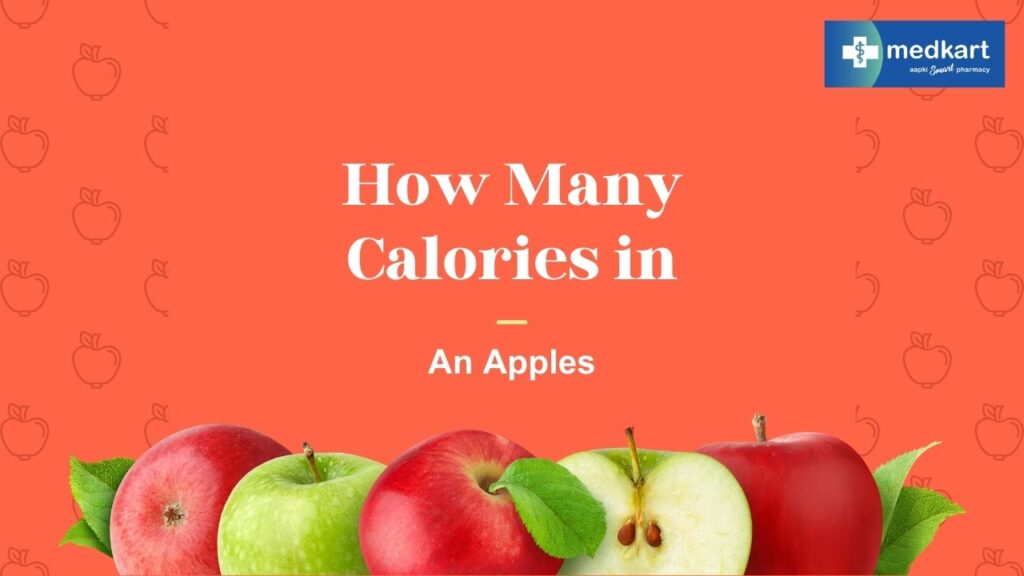Last updated on April 14th, 2025 at 05:53 pm

A medium-sized Apple contains around 95 calories. The humble apple has earned praise in nutrition for its crisp texture, refreshing taste, and myriad health benefits, making it a favoured snack. However, for those mindful of their calorie intake, it’s crucial to understand the nutritional content of this beloved fruit.
In the quest for a balanced and health-conscious lifestyle, understanding the nutritional composition of our everyday food choices is paramount. Amidst the array of wholesome options, the apple stands out as a symbol of nutrition and simplicity. Renowned for its crisp sweetness and versatility, the apple holds a special place in the world of nutrition. However, for those attuned to the nuances of caloric intake, unravelling the mysteries of how many calories reside within this beloved fruit becomes a pivotal step in making informed dietary decisions.
The caloric content of an apple depends on its size and variety. On average, a medium-sized apple, which is approximately 182 grams, contains around 95 calories. The calories in an apple primarily come from its carbohydrate content, with natural sugars being the predominant source.
Calories in one Apple
- Carbohydrates: Apples are primarily composed of carbohydrates, with natural sugars such as fructose and glucose being the main sources. A medium-sized apple typically contains around 25 grams of carbohydrates, making it an excellent energy source.
- Dietary Fiber: One of the standout features of apples is their high fiber content. A medium-sized apple provides about 4 grams of dietary fibre, contributing to digestive health and helping you feel fuller for longer. The fiber content also supports a healthy gut microbiome.
- Protein and Fat: While apples are not significant sources of protein or fat, they do contain small amounts of both. A medium-sized apple typically contains less than 1 gram of both protein and fat.
> Consult a Doctor and Medkart will help you Order Medicines Online
Macronutrients in Apples
Beyond calories, apples are packed with essential vitamins and minerals. They are a good source of vitamin C, an antioxidant that supports immune function and skin health.
Apples also contain small amounts of vitamins like vitamins A, K, and various B vitamins. Additionally, apples provide minerals such as potassium, which is crucial for maintaining proper heart and muscle function.

Benefits of Eating Apple
“An apple a day keeps the doctor away” is a timeless adage that reflects the remarkable health benefits associated with this ubiquitous fruit. Beyond its sweet and refreshing taste, the apple is a nutritional powerhouse, offering a myriad of advantages for overall well-being.
The diverse benefits of eating apples and why incorporating them into your daily diet is a wise choice are discussed below:
Rich in Nutrients
Apples are a rich source of important nutrients, including dietary fiber, vitamin C, potassium, and various antioxidants. These nutrients play a crucial role in supporting a healthy immune system, maintaining cardiovascular health, and promoting overall vitality.
Dietary Fiber for Digestive Health
One of the standout features of apples is their high fiber content. A medium-sized apple contains about 4 grams of fibre, which aids in digestion, helps prevent constipation, and supports a healthy gut microbiome. The soluble fibre in apples, such as pectin, also contributes to a feeling of fullness, making them an excellent choice for those looking to manage their weight.
Heart Health
Regular consumption of apples has been connected to a reduced risk of heart disease. The soluble fibre in apples helps lower cholesterol levels, while the antioxidants, particularly flavonoids, improve heart health by reducing inflammation and promoting healthy blood vessels.
Blood Sugar Regulation
Despite their natural sweetness, apples have a low glycemic index, meaning they have a minimal impact on blood sugar levels. The fiber content in apples slows down the digestion and absorption of sugars, helping to regulate blood sugar and reduce the risk of type 2 diabetes.
Antioxidant Powerhouse
Apples are loaded with antioxidants, including flavonoids and polyphenols. These compounds help combat oxidative stress in the body, neutralising harmful free radicals and reducing the risk of chronic diseases, including certain types of cancer.
Hydration and Oral Health
Apples have a high water content, contributing to hydration. Additionally, the act of chewing apples stimulates saliva production, which helps maintain oral health by reducing the risk of tooth decay and gum disease.
Weight Management
The combination of fiber, water, and natural sugars in apples makes them a satisfying and low-calorie snack. Including apples in your diet can aid in weight management by promoting a feeling of fullness without contributing excessive calories.
Brain Health
A few researchers have mentioned in their studies that apples have antioxidants that may have neuroprotective effects which potentially reduce the risk of neurodegenerative diseases such as Alzheimer’s. Quercetin, a flavonoid present in apples, is thought to contribute to the support of cognitive function.
Read: What are Generic Medicines?
Conclusion
The beauty of apples transcends their calorie count to embrace rich nutritional benefits. Packed with fiber, vitamins, and minerals, they offer a wholesome and satisfying snack, positively impacting overall well-being.
Including apples in your daily diet enhances health, supporting digestion, and heart health, and providing essential nutrients beyond their sweet taste. So, embrace this versatile fruit as a wholesome snack or a flavorful addition to your meals, and experience the countless advantages it brings to your well-being.
FAQs on Calories in an Apple
Q1. How many calories in an apple?
A medium-sized apple, weighing 182 grams, offers a refreshing snack with approximately 95 calories. Its nutritional profile includes a balance of natural sugars, dietary fiber, and essential vitamins, promoting overall health.
Q2. Do different apple varieties have varying calorie counts?
The calorie content in a medium-sized apple hovers around 95 calories, with minimal variations among different varieties. This consistency makes it a reliable snack option for those mindful of their calorie intake.
Q3. Are there more calories in an apple if you include the skin?
Including the skin adds negligible calories. The skin enhances its nutritional value by providing extra fiber and antioxidants without significantly impacting the calorie count.
Related Links:
- Anxiety Disorder
- What happens if we take Dolo 650 without Fever?
- Difference Between Anxiety and Depression
- Insulin Injection Sites
- What is Allergy?
- Hemorrhagic Stroke Paralysis
- Home Remedies for Acidity
- Acid Reflux – Home Remedies for Acid Reflux
- Bipolar Disorder Treatment
- ADHD Full Form
- How to Cure Depression?
